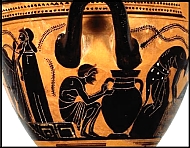
It was called metics to foreigners domiciled in Athens, in the Ancient Greece. On them fell many of the obligations of citizens. They had to serve in the army or in the fleet; pay general taxes, in addition, a special tax called metoikión. Very prominent foreigners received honors, rewards, such as not paying taxes. The Metecos, were object of great consideration, because, they constituted a numerous class more than 50.000, rich and cultured. The population of Piraeus, was composed mostly of metics. Foreigners were not allowed to live in Sparta. They made a great deal of profit in industry, commerce, citing the case of a very rich Metec who owned more than 600 slaves who worked, on their own, in the silver mines of Laurión. But, neither their wealth, nor their culture, nor their long residence in Attica allowed them to obtain political rights, since citizenship was strictly hereditary, only in exceptional cases did the Athenian assembly come to grant the Metecos the privilege of citizenship. Citizens constituted a minority of the population. In the middle of the 150.000th century BC, the numerical relationship between the three social groups was roughly the following, Athenians XNUMX, metics 50.000, slaves 120.000. When it is said 150.000 Athenians, women and children are included, which reduces the real number of citizens to a third, since women did not participate in political life, they were confined to the home, they had an indirect influence. Themistocles, She told her son and summed up the lives of women like this, "You are the most important character in the city, because I rule Athens, your mother sends me and you send your mother."